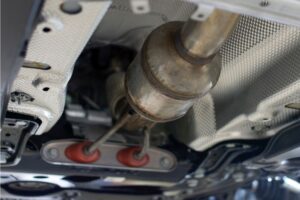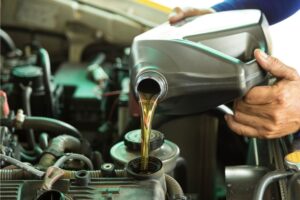There are many benefits of having catalytic converters, especially to the public and the environment, and these have now been made a legal requirement.
Not only do these reduce the airborne pollutants which could harm people, but they also improve your car’s efficiency.
If you are wondering do diesels have catalytic converters then yes, diesels do have catalytic converters in them.
However, these work differently than they would in cars with gasoline engines. This is because diesel engines and car engines are different.
These catalytic converters will help to reduce the airborne pollutants in cars. Every diesel system will therefore have a Diesel Oxidation Catalyst.
This will convert the carbon monoxide into carbon dioxide and break down any unspent fuel.
Functionally, the catalytic converter in a diesel system will work like a gas system catalytic converter. Diesel engines use compression to light the fuel up.
This article will tell you about catalytic converters, their function, and how they perform in diesel engines.
Table of Contents
How Much Do Diesel Catalytic Converters Cost?

Diesel catalytic converters are often not worth too much money.
This is because of the inexpensive materials used to make catalytic converters.
In catalytic converters, no precious metals, for example, platinum, rhodium, or palladium, are used.
However, some diesel catalytic converters can get pretty expensive, depending on which one you buy.
Although not very significantly, the higher priced ones will perform better than the cheaper ones. Catalytic converters are a common target of thieves due to their expensive materials.
However, the ones used in diesel ones do not use these expensive metals. Therefore, these are not as expensive.
How Diesel Catalytic Converters Are Different From Gas Catalytic Converters
As diesel and car engines are very different, catalytic converters operating in them are also very different.
A spark ignites the fuel in gas engines, also known as internal combustion engines. However, diesel engines light up the fuel using compression.
In diesel engines, the air to fuel ratio required for this is much higher, therefore to complete the ignition, diesel engines require a higher amount of oxygen.
How Diesel Catalytic Converters Work?
The diesel catalytic converter is not only a pollution filter. It is also a rearranger. It will rearrange the atoms and, by this, transform the chemical components in the exhaust fumes.
There are four phases for completing this process: exhaust gas recirculation, diesel particulate filter, diesel oxidation catalyst, and selective catalytic reduction.
Here, I will explain what happens in each of these phases!
Diesel Oxidation Catalyst
Every diesel system has this component. This is the first component of every exhaust system mostly.
This will transform carbon monoxide into carbon dioxide and decompose any unspent fuel. The function is similar to that in a gas catalytic converter.
It is also the smallest diesel converter element. However, as most of the valuable materials, such as palladium and platinum, are in this part, it is also very valuable.
Therefore, the recycling price for this is high.
Diesel Particulate Filter
Soot or particulates are created by diesel engines as a by-product, polluting. Internal combustion engines do not create this by-product.
DPFs use a wall flow monolith with open/closed channels that alternate and then capture these particles from the side of the inlet.
Then, these are kept trapped and then broken down. Then, a regeneration process is used to remove these.
This regeneration process is just like the DOC oxidation process. Organic material is burned, and CO2 and water are generated.
This part of the catalytic converter has a small amount of palladium and platinum to help with this process.
The soot needs to heat up to a high temperature to help it burn up and then pass through the filter’s walls, then be removed from the tailpipe.
Selective Catalytic Reduction
The SCR reduces fuel gases. Rhodium is a rare metal, which will promote the reduction process in a three-way converter.
Nitrogen oxide will be converted to oxygen and nitrogen as individual molecules.
But this cannot be done effectively in a diesel converter because the diesel exhaust has a lot of oxygen. For this reason, rhodium cannot reduce fuel effectively.
The SCR will employ a DEF diesel exhaust fluid, which is a chemical and composes either urea or ammonia.
This has catalytic materials, but these usually cannot be recycled. The fuel can be eliminated effectively by using catalysts and DEF.
A few SCR catalysts might have a small platinum portion. This is called the ammonia slip catalyst. This helps to remove any excess ammonia.
This part’s platinum is very little, so there are no benefits to recycling this.
How Long Will A Diesel Catalytic Converter Last?
Diesel catalytic converters usually last pretty long. This is about ten years. The mileage that these converters last is 100 000 miles.
Therefore, you won’t have to replace this product even after a long. But this number can be affected based on how many stops your vehicle takes.
This catalytic converter will wear out much more easily with vehicles with many starts and stop journeys.
In addition, it will also run out quicker in vehicles that travel long distances on a usual basis.
How To Know If The Catalytic Converter Has Failed
Many reasons might cause catalytic converters to fail.
These include restricting the free flow of exhaust gases, carbon deposits build-up, physical damage, overheating, infection, and other reasons.
Knowing if your catalytic converter has failed will depend on the converter type you have, as the symptoms are different.
However, generally, some common symptoms are your engine performing poorly, acceleration issues, the exhaust smelling like rotten eggs, dark smoke coming from the exhaust area, or if your vehicle overheats.
Most new vehicles will have oxygen sensors to light up if your converter has failed.
If you see any of the symptoms mentioned above, then you should take your catalytic converter to a mechanic to get it checked.
How Much Will It Cost To Replace My Diesel Catalytic Converter?
Getting a catalytic converter replaced is not cheap.
The average cost of getting your catalytic converter replaced for most vehicles is between $945 and $2475. This includes the labor and the parts.
However, as a diesel catalytic converter does not have that huge a composition of the expensive material, it might not be as expensive to replace as a normal catalytic converter.
You can expect to get your catalytic converter replaced anywhere between 70,000 or 100,000 miles of using it.
Can My Car Run Without A Catalytic Converter?
A car can function without a catalytic converter; however, it will perform much better with a catalytic converter.
In addition, it is important to be noted that catalytic converters are important to help protect the environment and are also required.
Therefore running your car without a catalytic converter might cause you to be paying some heavy fines in some states.
Can Catalytic Converters Be Cleaned?
Because catalytic converters have to deal with many toxic gases, these can face clogging very often.
If you ignore a catalytic converter that is clogged, then your vehicle might fail the emission test.
Clogged or converters that are unclean will not be as efficient. Because there are a lot of noble metal materials in your catalytic converter, you cannot clean them yourself.
You can get them cleaned by catalytic converter cleaners. These are experts that are good at cleaning your catalytic converter.
In addition, there is also less danger of getting your catalytic converter damaged after getting it cleaned by them.
Because catalytic converters are exposed to toxic gases frequently, they might become inefficient and malfunction, which is not uncommon.
So, in this case, you can use the catalytic converter repair service instead of replacing your catalytic converter.
Do Catalytic Converter Cleaners Work?
Because of the harmful gases, there will be a lot of carbon built up inside the exhaust. This is most common in catalytic converters that are old.
Therefore, catalytic converter cleaners break down the buildup. These are very effective in cleaning the carbon build-up, and they are the most experienced experts.
You shouldn’t be ignoring the carbon build-up for very long because if you don’t get it cleaned, you might have to get it replaced, and the cost for that is very high.
Comparing the cleaning costs and getting it replaced shows that getting it cleaned will save you a lot. You should know that the converter isn’t bad.
There is just a lot of toxic build-up inside it.
Catalytic Converter Placement
Depending on what make or model your vehicle is, the Catalytic converter will either be placed closer to the engine or further out, alongside the exhaust mechanism.
There are some benefits to having it close to the engine, as it can benefit from the heat.
So if you have it placed far from the engine, there will be less efficient because it will have to generate heat by itself.
Also, because it is not exposed to extreme conditions inside the engine, placing it far from the engine will allow the converter to last long.
Conclusion
Catalytic converters in diesel engines are essential, as the environment will be protected, and your vehicle will run much more smoothly due to the improved performance.
The function is the same as in gas engines. These function differently and are not as expensive as the gas ones. However, that doesn’t mean they don’t get stolen so be wary of that.
For as long as you get your converter cleaned whenever needed, it will last you a long time, with the efficiency of your engine greatly improved.
I hope you get the answer for your question of do diesels have catalytic converters and if these are important.
Catalytic converters are a must in every sort of engine, including your diesel one.

I am Tahir Azam, and I have been writing amazing articles for TaxiHack for as long as I can remember. I know everything that is to know when it comes to automobiles and is always on top of industry news and developments. While I am not an expert by any means, I pride myself on knowing the ins and outs of many different problems and, of course, their solutions. The articles on our website are some of the best and well-researched content that you will find, and I spend countless hours making sure this remains to be true. This is why I ask you to take your time out and read some of my articles, especially if you find a topic that resonates with you or is something you are looking into. This way, you will find the perfect mix of information and tips on your desired topic. Learn more about Tahir.


